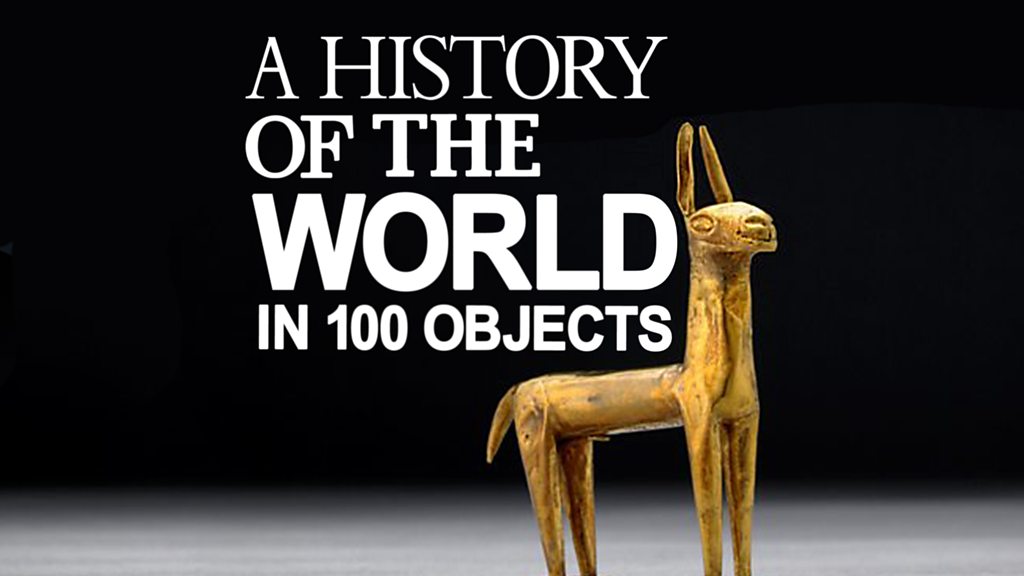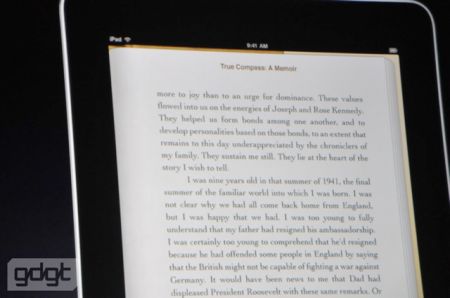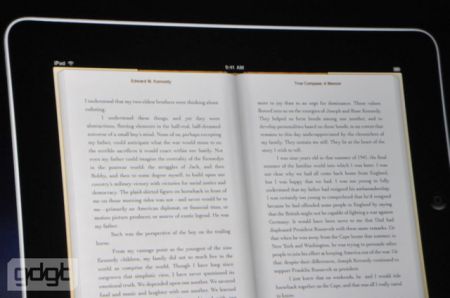Welcome the new Kindle competitor. Above, you’ll find some of the first pictures showing the ebook capabilities of Apple’s new iPad. We should have more thoughts on the iPad coming later today. Pictures come via gdgt.com, which has been providing excellent live coverage of the Apple event.
A History of the World in 100 Objects

Working with the BBC, Neil MacGregor, the Director of the British Museum, has launched a downright smart project. A History of the World in 100 Objects uses important pieces from the museum’s collections to recount the long history of humanity. Throughout the year, the serialized radio program will air 100 episodes, each averaging 15 minutes, and they will cover two million years of human innovation and artistic creation. Below, I’ve included a recent episode that revisits the Olduvai hand axe, a tool invented some 1.2 million years ago that proved vital to human evolution and our migration out of Africa. You can access the full series in audio via iTunes, RSS Feed, as well as other formats found here. A big thanks to Stephen in the UK for flagging this production for us.
The History of the Seemingly Impossible Chinese Typewriter
 The Chinese language has tens of thousands of characters, and many have considered it nearly impossible to fit these characters onto a single workable typewriter. But that hasn’t stopped inventors from trying … and, to a certain degree, succeeding. Stanford historian Thomas Mullaney is now writing the first history of the Chinese typewriter, and he has found evidence for numerous patents and prototypes that incorporate the most commonly used characters. In addition to making a political impact in China, these machines have also potentially influenced innovations in modern computing. You can read more about Mullaney’s work on Stanford’s Human Experience website, and also watch him discuss his work in this YouTube clip.
The Chinese language has tens of thousands of characters, and many have considered it nearly impossible to fit these characters onto a single workable typewriter. But that hasn’t stopped inventors from trying … and, to a certain degree, succeeding. Stanford historian Thomas Mullaney is now writing the first history of the Chinese typewriter, and he has found evidence for numerous patents and prototypes that incorporate the most commonly used characters. In addition to making a political impact in China, these machines have also potentially influenced innovations in modern computing. You can read more about Mullaney’s work on Stanford’s Human Experience website, and also watch him discuss his work in this YouTube clip.
Lessig on Political Corruption in America
Public confidence in the U.S. House and Senate is at an all-time low, and, after last week’s Supreme Court decision, it’s bound to sink even lower. On January 19th (the day before the decision), Harvard law professor Lawrence Lessig returned to Stanford and highlighted the degree to which “institutional corruption” — in the form of lobbyists and corporate influence — pervades Congress, dictates legislation, and brings large sums of money to campaigns and, yes, even representatives’ personal bank accounts. (Roughly 50% of U.S. Senators become lobbyists, working for industries they once assisted politically, and earn substantial incomes.) The talk, accompanied by a rapid fire PowerPoint presentation, runs a solid hour and details various instances in which lobbyists have shaped unfathomably bad legislation. Happily, the talk also ends with Lessig outlining possible solutions. Policy changes can offer some answers. But, a lot of it comes down to this: getting the passive privileged to rein in a corrupted elite.
Note: To see Lessig’s immediate response to the SCOTUS decision, look here.
Richard Dawkins on the Awe of Life & Science
Here’s some vintage Richard Dawkins. Back in 1991, the Oxford University biologist presented a series of lectures for the Royal Institution. In the very first lecture (presented above), Dawkins forces his audience to confront some big questions. (What’s the origin of life? Where do we fall in the scheme of life on planet Earth? What’s our role in the larger universe? etc.) And he reminds us that we’re extremely privileged to have the brains and tools (namely, reason and science) to make sense of the awesome wonders that surround us. We’ve evolved and grown up, he says. We don’t need superstition and the supernatural to explain it all. We just need ourselves and our faith in science and its methods. It’s classic Dawkins.
The 55-minute talk is now added to our YouTube favorites, and we’ve also added Dawkins’ YouTube Channel to our collection of Intelligent YouTube Channels.
Introduction to New Testament History and Literature: A Free Yale Course
Taught by Yale professor Dale B. Martin, this course offers an introduction to New Testament History and Literature, and covers the following ground:
This course provides a historical study of the origins of Christianity by analyzing the literature of the earliest Christian movements in historical context, concentrating on the New Testament. Although theological themes will occupy much of our attention, the course does not attempt a theological appropriation of the New Testament as scripture. Rather, the importance of the New Testament and other early Christian documents as ancient literature and as sources for historical study will be emphasized. A central organizing theme of the course will focus on the differences within early Christianity (-ies).
You can watch the 26 lectures from the course above, or find them on YouTube and iTunes. To get more information on the course, including the syllabus, visit this Yale website.
Introduction to New Testament History and Literature will be added to our collection, 1,700 Free Online Courses from Top Universities. There you can find a specialized list of Free Online Religion Courses.
If you would like to sign up for Open Culture’s free email newsletter, please find it here. It’s a great way to see our new posts, all bundled in one email, each day.
If you would like to support the mission of Open Culture, consider making a donation to our site. It’s hard to rely 100% on ads, and your contributions will help us continue providing the best free cultural and educational materials to learners everywhere. You can contribute through PayPal, Patreon, and Venmo (@openculture). Thanks!
Jared Diamond Explains Haiti’s Enduring Poverty
Jared Diamond, the Pulitzer Prize-winning author of Guns, Germs & Steel (and Collapse: How Societies Choose to Fail or Succeed), offers some timely thoughts on why Haiti, once a fairly prosperous country, has sunk into enduring poverty — a condition not comparatively shared by its neighbor on the same island, the Dominican Republic. According to Diamond, Haiti’s environmental conditions offer a partial explanation. But you will also find clues in the country’s language, and in the legacy of slavery that has shaped Haiti’s economic relationship with Europe and the US. This interview — quite a good one — aired this morning in San Francisco. You can listen to it below, or access it via MP3, iTunes or RSS Feed.



